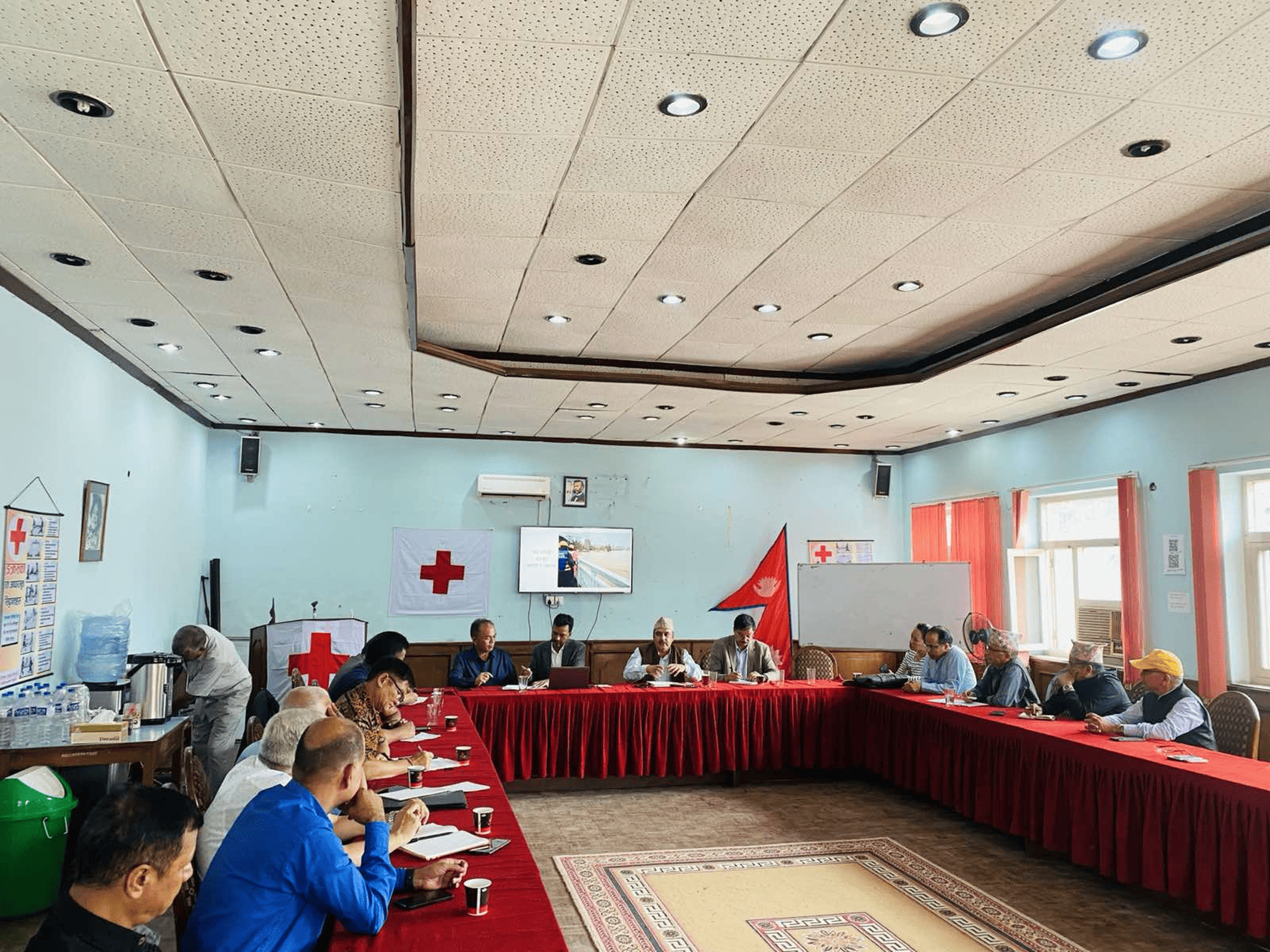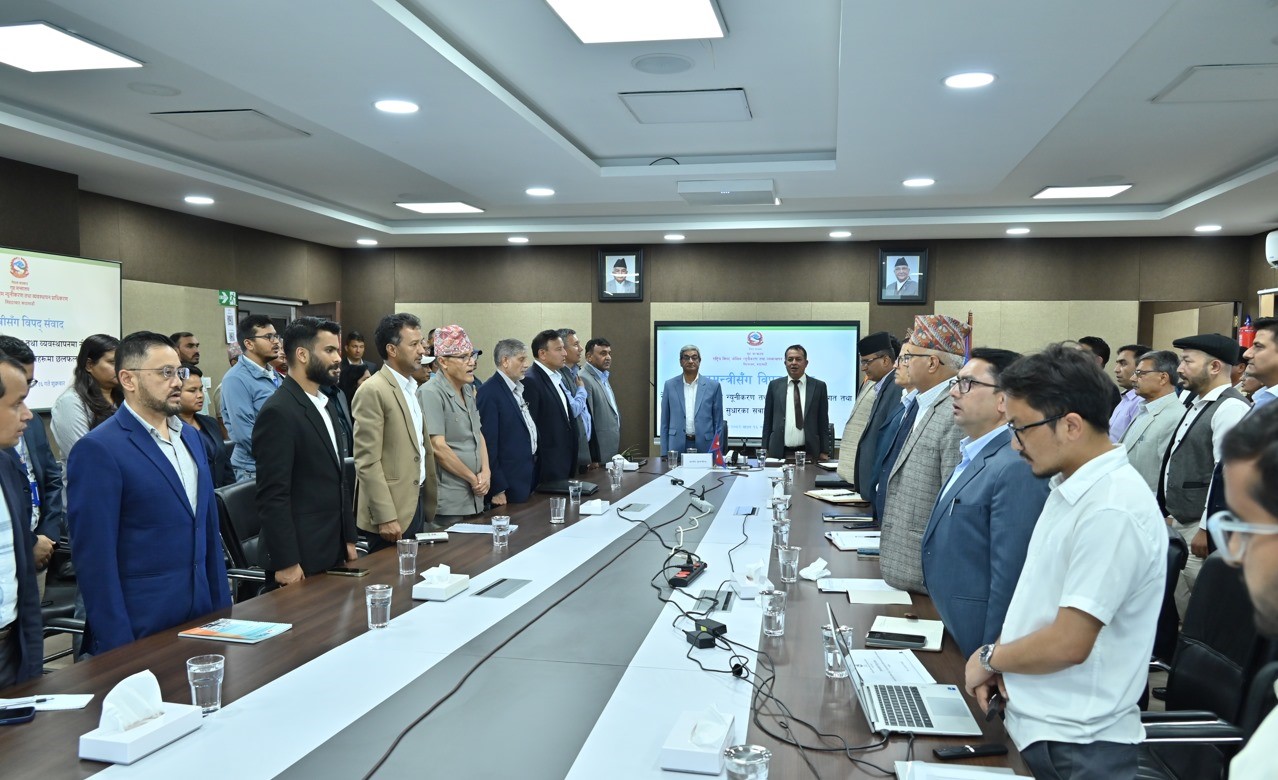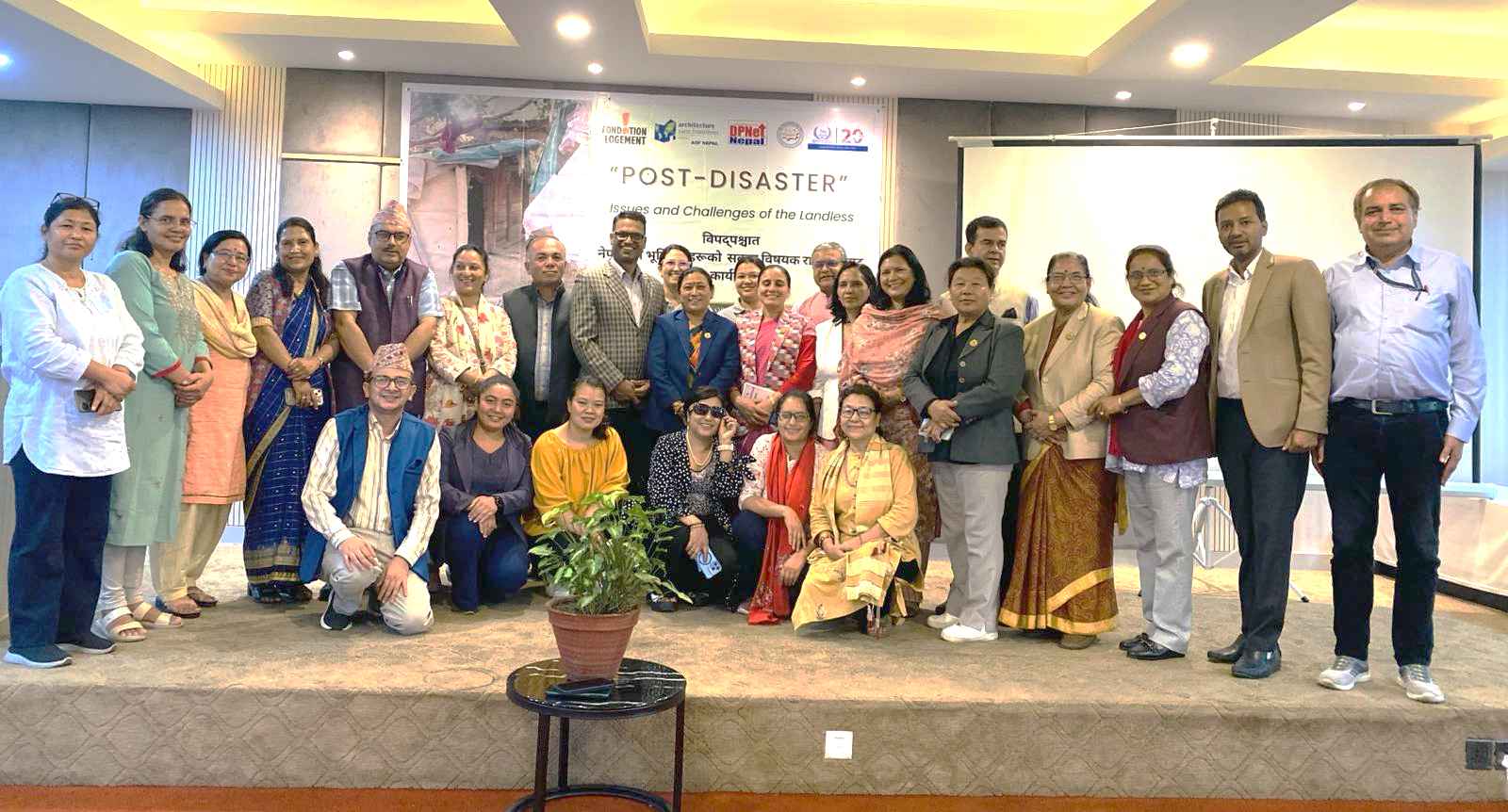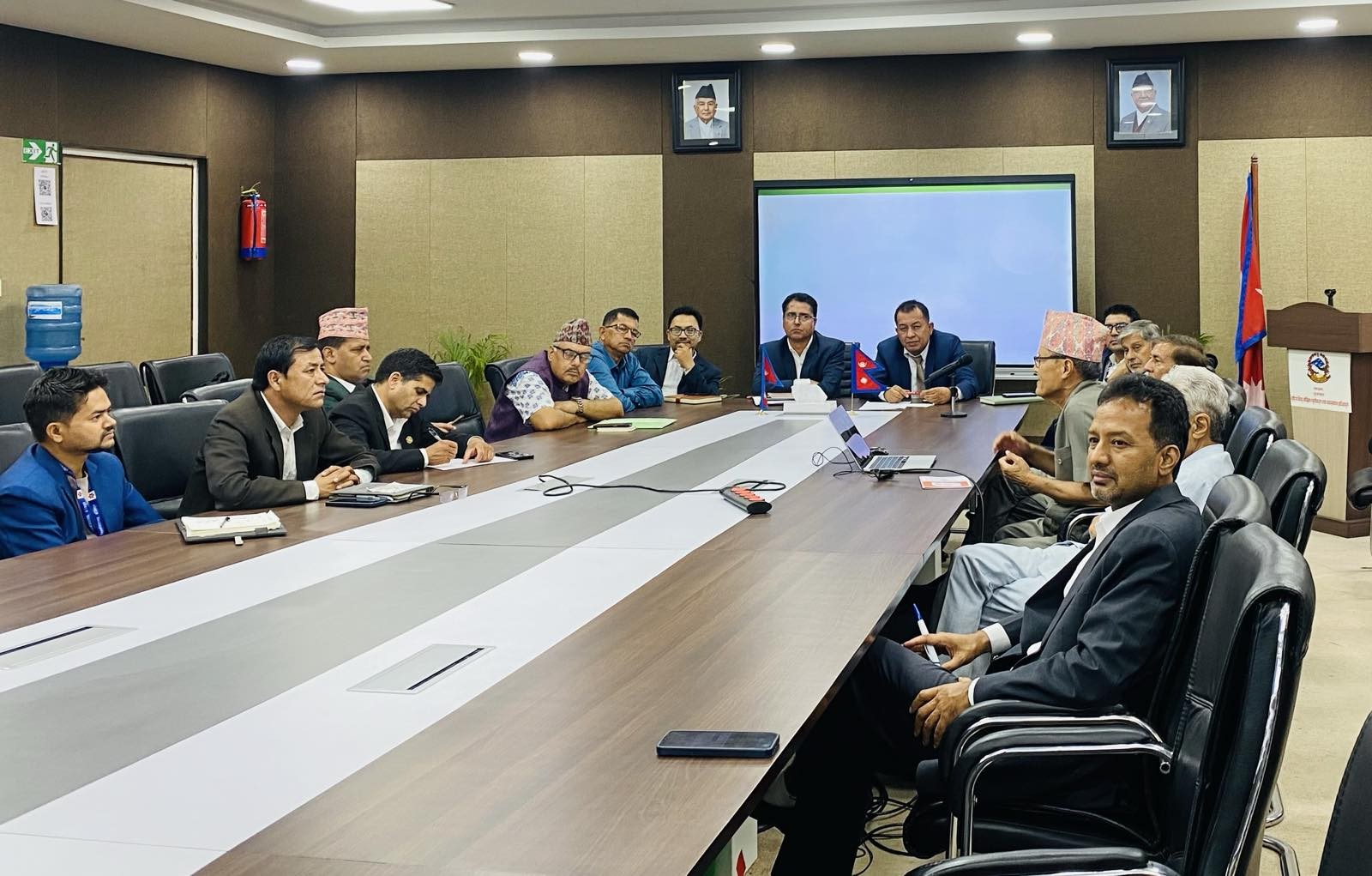DPNet Nepal Discussion Program with Advisor

On October 6, 2024, DPNet Nepal organized advisor meeting at Nepal Red Cross Society Hall. The objective of the discussion was to highlight the challenges faced by country in the wake of the devastating floods and landslides. The insights shared by the speakers reflect a recognition of the systemic failures that have exacerbated the impact of this disaster.
Dr. Raju Thapa, Chairperson of DPNet, emphasized the urgent need for proactive disaster preparedness and timely governmental action. Reflecting on the tragic loss of life and widespread devastation, it is clear that we must learn from these events to pave the way for effective risk management and disaster response. Dr. Thapa stressed the importance of improving communication, enhancing alert systems, and ensuring the accountability of authorities. He called for a collaborative approach, leveraging the expertise of all stakeholders—government bodies, civil society, and local communities—not only to address the immediate aftermath of disasters but also to implement sustainable strategies that prevent future calamities. Through knowledge sharing, strategic planning, and community engagement, we can build resilience in our societies and ensure that no lives are lost due to negligence. It is time for action, reflection, and a united front in the face of adversity.
Mr. Surya Bahadur Thapa, IPP, DPNet Nepal, expressed deep concern over the recent monsoon floods and landslides. He urged members to approach the situation calmly to make sound decisions for mitigating such disasters. Despite warnings about the monsoon rains, significant suffering occurred, and infrastructure was heavily damaged. Mr. Thapa highlighted the need for accountability from authorities who failed to protect citizens, emphasizing that the members present must play a key role in policy implementation, advocacy, and risk reduction efforts. He stressed the importance of collaboration between professionals, timely communication, and interlinking efforts with government bodies at all levels. Mr. Thapa also pointed out that municipal authorities knew of the risks to settlements near riverbanks and could have used simple measures, like microphones for warnings and schools or party venues as evacuation centers, to reduce harm. He called for evidence-based action and collective efforts to prevent future disasters, urging the members to take responsibility and work together to implement necessary changes. Mr. Thapa emphasized that the challenges we face are pertinent to all citizens, highlighting the need for a proactive approach. He encouraged voluntary advocacy and collaboration with all advisory committees to address these issues. Additionally, he suggested that policy auditing should be prioritized to ensure effective implementation and accountability.
Dr. Dharam Uprety, Advisor, DPNet Nepal commented that DHM Nepa is a risk communicator; however, the department people are scared. Besides it, there were also positive interpretations made by DHM Nepal; similar is the case with NEOC, as it also goes under emergency with the emergence of any disasters. In accordance with the recent flood, he highlighted the gap in communication update on the flood alert systems and lack of timely law enforcement, uncommitted and frequent replacement of government official members, establishment of the required institutions, but the lack of working in the field as the reasons for the damage faced in higher intensity by the people. Further, he emphasized the need for collective voice, reducing fear of internal psychology, minimizing ego, and changes in the traditional working needs to be addressed for preparedness and risk reduction.
Mr. Ram Prasad Bhattarai, Advisor at DPNet Nepal, pointed out that there was insufficient time to alert people for evacuation. He mentioned that despite water level monitoring at the Kulekhani Dam, where the gates were opened, causing floods in many areas, better vigilance and communication with the relevant authorities could have reduced casualties. He also commented that the deaths from the Jhyalpe Khola landslide were due to negligence, which could have been prevented with a more effective traffic response system. Regarding the situation of people in the Nakhhu area, who were forced to stay on rooftops for several hours, he emphasized that evacuation should have occurred before the water level rise. Mr. Bhattarai praised the use of SMS alerts as a good practice but noted that the system lacked timely updates, with warnings being delayed due to information traffic. He concluded by stating that with long-term detailed planning, proactive advocacy, and timely action, the organization could grow stronger and better prepared.
Mr. Bamshi Aacharya, Advisor DPNet Nepal has raised concerns regarding the lack of efforts by government officials at municipal levels in addressing disaster preparedness and recovery. He emphasized the urgent need for crisis zone assessments, the establishment of recovery laws, and increased pressure on officials to enforce these laws to ensure early preparedness. It has also been observed that those responsible for disaster response, especially local authorities like mayors, are neglecting their duties. They seem to focus on the needs of the community only during election times. This neglect is evident in the lack of timely rescue efforts, such as when people stranded on rooftops could have been saved if authorities had acted promptly. The overall response from officials remains inadequate, with outdated methods and repeated decisions that fail to address the current needs of disaster management. He emphasized that though there are high expectations for recovery, there is a lack of proper tools and resources to meet these demands, making it critical to assess what progress, if any, has been made in recovery efforts. As a key platform for DRR, DPNet Nepal plays an important role in tracking these issues and applying pressure on authorities to take necessary action. However, he provides suggestions and recommendations to ensure the implementation of all the collected suggestions and learnings. It is essential for these suggestions to be acknowledged and acted upon by both local and higher authorities to ensure meaningful progress in disaster preparedness and response. He also advocated that the situation, provisions, and responses need to be accurately reflected in order to determine a clear way forward. This alignment is essential for effective planning and action.
Mr. Thule Rai, Advisor, DPNet Nepal, highlighted the lack of coordination between levels of government and the structures involved in disaster management. He emphasized the need for timely media handling and improved communication. In terms of preparedness, he noted that the budgets for responding agencies have not been consistently allocated. Regarding the training on response and rescue, it has significantly decreased compared to the past. Mr. Rai also pointed out that sensitive issues should be addressed by the responsible authorities. He mentioned that seasonal changes cannot be controlled, but if the right personnel are in place, continuity in services could be maintained. Furthermore, he stressed the importance of creating a generic checklist for government agencies to follow in disaster response, along with established protocols. Although the NDRRMA has a framework, it currently lacks detailed content and actionable items. Further, he highlights the importance of the mobilization of manpower, authorities, and volunteers in evacuation and relief programs. He shares his observation on the Bhardaeu Lalitupur and Nakkhu rivers lacking a siren warning system, which needs to be worked on to prevent further calamities.
Mr. Dinanath Bhandari, Advisor, DPNet Nepal, highlighted several critical issues in disaster management that need urgent attention. He noted that major decisions are often made without thorough field assessments, emphasizing the necessity for CDOs to engage directly with communities in the field. Additionally, he pointed out that employees must effectively communicate decisions made by the Council of Ministers to ensure clarity and transparency. Mr. Bhandari also identified a conflict between the MoHA and the NDRRMA. He stressed the importance of NDRRMA developing its own work plan and annual budget rather than relying solely on certain companies and donors. Furthermore, NDRRMA should be able to address and discuss any shortcomings in its current operations. He advocated for the establishment of regulatory authorities under the law and emphasized the need for clear communication and coordination among the three tiers of government. Mr. Bhandari called for strong advocacy efforts to tackle these pressing issues. He also pointed out that the Sendai Framework should be aligned with both Local Disaster Risk Financing and National Disaster Risk Financing to enhance disaster resilience. He raised concerns about SMS systems often jamming, which complicates communication in critical moments. Additionally, he mentioned that the polygon system in Kathmandu is not functioning effectively due to the high number of towers, and urged efforts to better utilize ringtone alerts for effective communication during emergencies.
Mr. Tirtha Joshi, DPNet, Advisor, emphasized the importance of local governance in disaster response, stating that CDO must go to the affected areas to facilitate relief efforts. Mr.Joshi advocated for local bodies to take responsibility, suggesting that if the response comes from the ward level, it would be more effective. He stressed that the Constitution recognizes this need, although it may not explicitly outline the roles of local bodies in disaster management.
Mr. Shyam Sundar Jnavaly, DPNet Nepal Advisor, expressed concerns regarding the current state of disaster management. He noted that while there is a formal structure in place, it is primarily seen on paper and lacks effective implementation in a proactive manner. He emphasized the need for development initiatives to begin at the ward level to ensure a more responsive approach. He highlighted that meetings are essential for fostering collaboration and improving the overall effectiveness of disaster management strategies.
Mr. Ram Chandra Neupane pointed out that many municipalities are experiencing ineffective communication between the DEOC and local levels, which has led to insufficient information collection and dissemination. He noted the lack of an online system to streamline this process. The initial plan involved the DEOC entering data while the NDRRMA would verify it; however, this plan has not been effectively implemented.
Mr. Amod Mani Dixit, Advisor, DPNet Nepal, emphasized the importance of understanding events in general terms, particularly regarding the return period of disaster events. While a lot of knowledge has been gained, there are still gaps. Many discussions have focused on hazards and risks, but there are issues when it comes to resilience. the observations reveal that it’s not just about the equipment, but also about human resources. The NDRRMA has not been able to take any action on the six identified issues of them.
Mr. Jagannath Kurmi, Board member, DPNet Nepal, emphasized that despite investing millions in the formulation of Local Adaptations Plan of Actions, there has been a lack of focus on its implementation. He highlighted that if we approach or authorize local leaders, such as ward chairpersons, they are likely to prioritize those who voted for them in the past. Additionally, he pointed out a significant lack of preparedness and planning at the local level, which hampers effective progress.
Mr. Rupendra Basnet, Advisor, DPNet Nepal, mentioned the importance of understanding the flow of water in rivers and highlighted the issues of information dissemination and communication gaps. He stated that when it comes to the Bagmati region, effective risk mapping would be beneficial.
In his concluding remarks, Dr. Thapa emphasized the importance of translating the rich discussions and insights shared during the meeting into actionable recommendations. He proposed that a consolidated set of recommendations be prepared and submitted to the Prime Minister, addressing the critical gaps in disaster management, communication, preparedness, and accountability. Dr. Thapa stressed that these recommendations should highlight the urgent need for systemic improvements in disaster risk reduction and response. He expressed his heartfelt thanks to all the advisors and participants for their valuable contributions to the discussion. As the program came to an end, Dr. Thapa extended his warm wishes for the upcoming festive season of Dashain, Tihar, and Chhath, wishing everyone happiness, health, and safety. With these words, Dr. Thapa formally closed the program.











